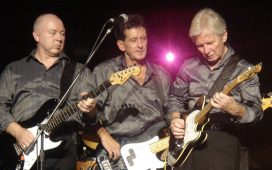On the brick wall behind where Muna are sitting, huddled on a picnic bench in London’s Strongroom, is a blue plaque informing us that these are hallowed grounds: “Spice Girls recorded ‘Wannabe’ at Strongroom,” it reads, “and held dance rehearsals in this courtyard.”
It seems fitting, us meeting here, because the Los Angeles band have something of a modern-day Spice Girls about them: anarchic, inventive, with a knack for a pop hook that thwacks you round the head and heart.
Unlike Spice Girls, though, Muna are not yet global superstars. They might make some of the best pop music around, inspire an almost religious fervour among their fans, many of them queer women and non-binary people, and be held up as evidence of pop’s growing diversity and progressiveness, but, as guitarist Naomi McPherson puts it, “it’s not like we’re getting the same f***ing opportunities as cis straight white men.
“The white dudes are still the ones that get on the festival line-ups. We live in a bubble of lovely, queer, safe spaces online and at our shows, but that ain’t the real world.”
The band, who sporadically prod at the infrared heater while they adjust to England’s idea of summer, are discussing whether they ever feel like their identities are commodified in the name of selling records. They do. But they’ve made peace with it. “Capitalism and neoliberalism are the hellish landscapes that we live in,” says McPherson, who as a queer, non-binary person of colour is used to being pigeon-holed.
“You are going to use us to try to convince people that we live in a more leftist, progressive, accepting reality than we live in, and all the while we’re being marginalised in this f***ing industry? People might say we are one of the bigger queer bands right now” – the band’s recent single “Silk Chiffon”, a collaboration with Phoebe Bridgers and the musical equivalent of rainbow confetti, has been their most mainstream hit yet – “but we live under the same financial oppression that queer people in every line of work live in, which is: we’re not being paid the same as other people in our lane.”
They shrug. “It’s just the truth. I’m an anti capitalist, but like, f***ing pay me.” Lead singer Katie Gavin, 29, and guitarist Josette Maskin, 28, cackle in approval. Then Maskin, who has up until now been busy stroking a dog named Dingo, pipes up in a goofy voice: “Wheeere’s the money?”

This is how it is to have a conversation with Muna: shrewd, piercing observations are liberally seasoned with swear words and silly jokes. Adorned with matching tattoos (an M, a swallow, and the 7.7 Pitchfork score given to their second album Saves the World), the three of them nod along with each other’s diatribes on homophobia and capitalism, then interrupt to elaborate, or disagree, or to tell their bandmate that “you’re touching my butt”.
Their answers tend to overlap, too, which renders transcribing a near-impossible mission. They know that. “Is it helpful if we say our names for you, for transcribing purposes?” McPherson kindly offers at one point. At least I think it’s McPherson. “Sometimes we all have identical vocal fry.” “It’s Los Angeles Dyke,” adds Maskin.
This dry humour has always been a part of Muna – but not always a part of their music. The band met at college in California, and as Maskin put it in a previous interview: “Katie saw me from across the room, said ‘gay’, and then we started to play music together.” Their first album, the pulsating, synthy About U, was full of sad-pop bangers. On “Crying On The Bathroom Floor”, Gavin examined her self-destructive romantic tendencies: “Gimme your disrespect/ Gimme your pain and loneliness/ And I’ll love you the best.” “I Know A Place”, meanwhile, was released just after the 2016 mass shooting in an Orlando gay club (though it was written before it) and became an ode to queer safe spaces: “If you want to go out dancing/ I know a place/ I know a place we can go/ Where everyone gonna lay down their weapon.”
More from Culture
It wasn’t long before their musical fingerprints were all over pop: listen to Katy Perry’s “Never Really Over”, or Taylor Swift’s “The Man”, and you’ll see what I mean.
Their brilliant second album, Saves the World, written just after they’d toured with Harry Styles, was a little wryer: “So I heard the bad news,” they sang on “Number One Fan”. “Nobody likes me and I’m gonna die alone in my bedroom.”
But for the most part, they haven’t quite been able to get their humorous side across – until now, with their third, self-titled album, and its bright, bubblegum, Stetson-filled videos.
“We just have so much fun together,” says McPherson. “On the road, in the studio, we enjoy just making each other laugh and not taking everything super seriously, even though we all are quite serious people, and can also, frankly, all be quite depressed at times.
“But the only way that you make it through that disposition, I think, is by taking the piss. It’s a coping mechanism that we use, that wasn’t really integrated into the way that we were perceived as a band. But now that the music can match that energy, and also reflect our more severe sides, it does feel like a more fully integrated picture of who we are as people. Which ultimately is why you make music.”
“We were trying to seriously figure ourselves out at a certain point,” says Maskin. “And then we kind of were like, ‘Actually, life is stupid. And it doesn’t matter.’”

That’s not quite the message that the new album puts across, but there is a breezy head rush feel to much of it. “Life’s so fun, life’s so fun, got my mini skirt and my rollerblades on,” sings Gavin, who writes most of the band’s lyrics, on “Silk Chiffon”. “You’re gonna say that I’m on a high horse/ I think that my horse is regular-sized,” she sings on the delicate earworm “Anything But Me”. “Did you ever think, maybe, you’re on a pony?”
The record takes inspiration from all over – LCD Soundsystem, Charlotte Gainsbourg, Daft Punk, Shania Twain, Backstreet Boys – and ends up sounding like none of those; country power ballads give way to moody synth numbers give way to shimmering pop songs. It might be their best yet.
But Muna nearly never made a third album. When Saves the World didn’t chart in 2019, their major label, RCA Records, home of Britney Spears, dropped them. Gavin is sanguine about that now. “You can’t force these things to happen,” she says. “It’s a natural, mystical process, like a f***ing flower blooming. So what are you going to do?”
They signed to Phoebe Bridgers’ label Saddest Factory instead. “We’ve been through so many absurd experiences now, whether it’s going through a rejection of an album or getting dropped by a label…”
“We’re just older,” interjects Maskin. They had just entered their 20s when they started the band; now they’re approaching 30.
Besides, they’ve realised there’s no point trying to predict anything. Gavin didn’t expect that “Silk Chiffon” would blow up like it did, especially “after our own period of like, ‘Wow we really don’t even know if we’re going to keep going as a band.’ It just kind of shows you: ‘I’m not in control.’ It’s all just so funny. And you should just enjoy it and you shouldn’t take it so personally how things pan out. As long as we have people showing up and we can buy ourselves food, we’re gonna f***ing crack on. And try to have some fun with it.”
Queer joy is a radical thing… you cannot stop us from being here. And you cannot stop us from living full happy lives
Muna guitarist Naomi McPherson

Was there actually a moment when they thought they might not carry on? “Yep,” says Gavin. “Not for me,” says McPherson, “because I don’t know what else I would do.” “I don’t know what else I would do either – I was just unhappy,” interjects Maskin.
“But if I’m being frank, it was during the pandemic and it was during intense racial injustices that were going on everywhere, and I felt, like, suicidal. I don’t think I’ve ever felt so low. I also just felt like: I don’t know if I get enough meaning from this…”
Remembering how much she loved performing brought Maskin back from the brink. “Sometimes I don’t know that I’m missing an experience until I have that experience,” she says. “And playing a show and connecting with our fans is maybe the most earth-shattering experience for me, to feel like I am actually a human on earth. I didn’t realise that ‘till we played a show again. You’re like, ‘Holy f***ing shit. This is what it’s about’.”
A few hours after we speak, they’ll play a joyful, ground-shaking set at The Garage in north London, at which most queer British popstars, and Phoebe Waller Bridge, are in attendance. “It grounds you in your purpose,” says McPherson, “in what can sometimes feel like vanity.”
Their main purpose: promoting queer joy. “Queer joy is a radical thing,” says McPherson, “because intense queer stories are the ones that are fed to us by the entertainment industry. And also, think about what’s going on all over the f***ing world – you cannot stop us from being here. And you cannot stop us from living full happy lives.”
Related Stories
“I think a lot of transphobia and homophobia is masked in a concern for somebody’s joy,” adds Gavin. “It’s like, ‘Well, I love you and I just want you to have a good life, and this is such a hard road.’ And really, what those people are actually doing is standing in the way…”
The other day, she was walking through a city “doing some gay PDA”, and she found herself asking the person she was with: “Do you feel nervous? Do you feel scared of something happening?”
It’s a thought that anyone who’s been queer in public has had. “And that’s not paranoia. That’s a real thing that we still have to think about. But I do think that loved ones and allies, they underestimate how joyful it can be for them to just affirm their kids’ experiences. Their life is actually gonna be a lot more happy if you just let them do what they want to do.”
Nowadays, McPherson sees it as their responsibility to live openly. “If you live in a major metropolitan city, with access to queer communities, it’s your duty, if it’s safe, for you to be yourself, because there are millions of people all over the world who can’t do that,” they say.

“We are in such a position of privilege, where we live, to not feel constantly physically in danger – sometimes, for sure, but not all the time. So you try to leverage your privilege to allow for some degree of visibility for people who might not have hope. Hope is all you f***ing have. Hope is all we have. Because everything is shit.”
Gavin laughs. “Because everything is shit,” she repeats solemnly.
“It’s true!” says McPherson. “Like, what can you f***ing do other than have hope? You either give up or you have hope. So sometimes you have to live that hope.”
Muna’s self-titled third album is out on Friday 24 June


















